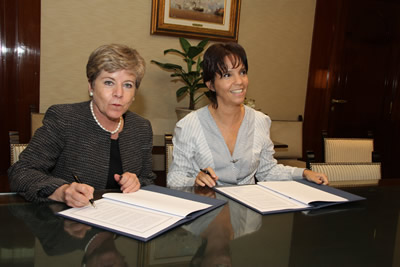Commodity Price Rises and Volatility Pose a Challenge to Latin American Economies
Alicia Bárcena gave a lecture on this topic in Buenos Aires, where she also signed a cooperation agreement with the country's Central Bank.

(21 May 2011) The new commodity price hike seen in recent months, especially for agricultural, mineral and energy goods, is generating uncertainty and stands in the way of investment and the sustained accumulation of technological and productive capacity in Latin American and Caribbean countries, according to the Executive Secretary of ECLAC, Alicia Bárcena, who was speaking during a two-day visit to Buenos Aires, Argentina, which ended yesterday.
Ms. Bárcena was the main speaker at the second day of the G-20 workshop on commodities that was being held in the Argentine capital and attended by ministerial authorities from the economic, agricultural and energy spheres in G-20 countries, as well as senior officials from international agencies.
The most senior representative of ECLAC stated that commodity price volatility is a challenge to economic policy creativity in the region. She highlighted the fact that the exact implications of this phenomenon for each country depend on whether they are net exporters or importers of such products.
Food price indices as estimated by several organizations, including FAO, climbed by around 30% between June and December 2010, before reaching a record high in January 2011. Increases in wheat and maize prices (94% and 64%, respectively, between June and December 2010) had a strong impact on Latin American and Caribbean economies. Meanwhile, mineral and energy prices have soared even more quickly.
According to Ms. Bárcena "Price rises tend to increase inflationary pressure, reduce food consumption among the poorest groups in society and generate unsustainable imbalances in countries' current accounts".
Against this backdrop, she described the possible effects of climate change as another source of uncertainty that discourages investment.
The Executive Secretary of ECLAC recommended the implementation of policies to mitigate the impact of commodity price rises and volatility in at least three economic areas: trade, production and macroeconomics.
In the area of trade, she said international coordination should be promoted with a view to avoiding food shortages in importing countries and halting instability in exporters and importers alike. In terms of production, she advised increasing crop production and reducing vulnerability in consumer demand.
As for macroeconomics, she suggested measures to preserve industrial competitiveness and promote employment, while also controlling inflation and price volatility.
During her address, Ms. Bárcena recalled the Prebisch-Singer thesis on the deterioration of terms of trade for developing countries, and stressed the importance of deepening productive convergence with innovation, science and technology and active production and industrial policies.
In Buenos Aires, the ECLAC Executive Secretary met with the Argentine Minister for Social Development, Alicia Kirchner, and the President of the country's Central Bank, Mercedes Marcó del Pont, with whom she signed a cooperation agreement for the completion of joint studies.
Any queries should be addressed to the ECLAC Public Information and Web Services Section.
E-mail: dpisantiago@cepal.org; Tel.: (56 2) 210 2040.
Follow us on: Twitter , Facebook , Flickr and YouTube.
Country(ies)
- Latin America and the Caribbean
Contact
Public Information Unit
- prensa@cepal.org
- (56 2) 2210 2040